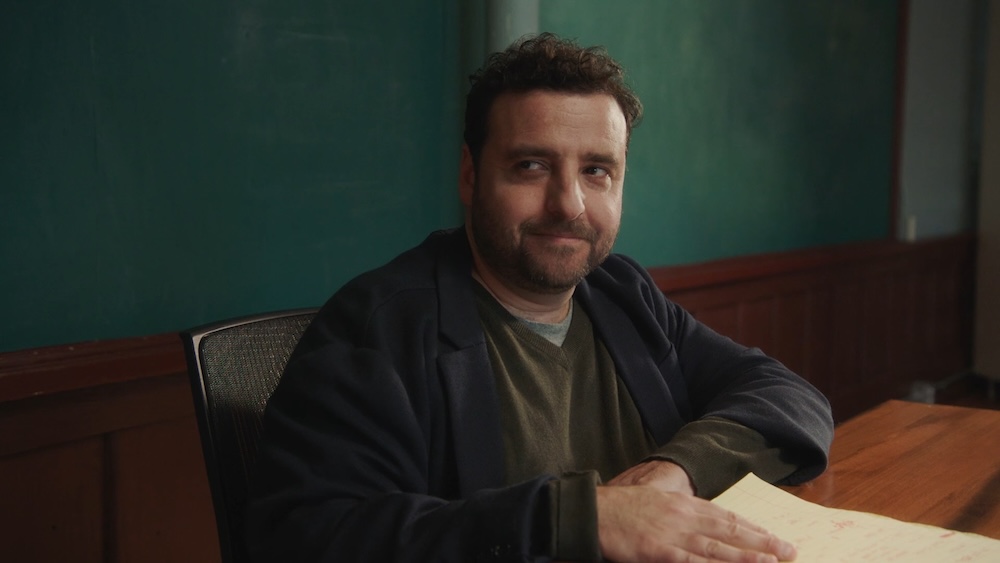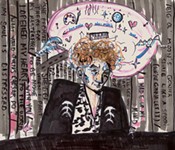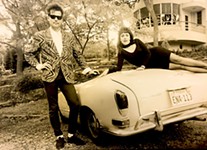At Wit’s End: Bob Byington on His Dry New Comedy, Lousy Carter
“My career puzzles people, including myself”
By Shawn Badgley, 8:30AM, Wed. Mar. 27, 2024
Turns out the pandemic has really done a number on us.
Even Bob Byington, who heretofore might have seemed impervious to something like a public health emergency, was left a little shaken by it all. He wrote the screenplay for his seventh film while holed up in the Midwest during lockdown, and Lousy Carter hums with the echoey, dreamlike unease of abandoned or half-filled places. An empty rail car. Pickleball courts. The cold, dark chambers of a college campus.
Passing through this muted landscape is the eponymous professor, played by David Krumholtz, whose specialty is The Great Gatsby. As if that weren’t sad enough, within the first five minutes of the film, he learns he has a terminal illness with months left to live. And things only get worse from there.
Krumholtz is so good in the role that he’s almost uncomfortable to watch at times. With hurried phrasing, pained expressions, and self-deprecating misfires, Lousy galumphs from indignity to indignity. His doctor. His doctor’s receptionist. His ex-wife. His friend. His therapist. His mother. His students. Each encounter seems to increase his isolation by another order of magnitude.
“One of the things Lousy Carter’s about is what if you suddenly became a person living in a world where everything you’re doing, you’re kind of doing it wrong? And that’s based on my life. It was weird to wake up one day and feel that I was out of step with the culture,” Byington says.
“When the pandemic hit, I had moved up to Milwaukee a couple of weeks before to work on a TV script, and then everything shifted. It felt like that material became obsolete overnight. I looked at it, and it just seemed ridiculous given what was happening. The voice in my head that had always said, ‘Oh, you can wait to write another movie,’ for whatever reason, it was replaced by another voice saying ‘You actually can’t really wait to write another movie.’”
The result manages to blend the controlled burn of Byingtonian wit with a mediation on the limits of tragicomedy itself. After all, no medicine, not even laughter, can cure us when our time has come. Casting about, Lousy looks for 11th-hour redemption in the eyes of student Gail (Luxy Banner in a brilliant, breakout performance), who sees right through him.
“I was one of the less experienced actors on set,” Banner says, “and where I might feel intimidated by working alongside a legend like David, I had to be unimpressed by him in order for our relationship as Gail and Lousy to come through honestly.”
Nowhere is Gail more honest than when she dismantles The Great Gatsby during class, finally snapping Lousy out of his torpor. In doing so, she sharpens his senses, spurs some self-awareness, and reignites interest in a dormant project. Along the way, they each seem to understand that they’re supposed to feel something for the other in a certain way, but don’t. It’s a pas de deux that serves as a notable departure from much of Byington’s previous work.
“I think most viewers won’t perceive a whole lot of sexual tension,” he says. “Everything is very puritanical now.”
If that sounds like a laying down of arms from a filmmaker who first captured the industry’s attention with an effort called RSO: Registered Sex Offender and whose last project, Frances Ferguson, was about a teacher who had an illicit relationship with her student, the strategy seems to be working: In one of the biggest coups of Byington’s career, the prestigious Magnolia Pictures picked up Lousy Carter for distribution, and after a fruitful festival run, the film is now set for theatrical and streaming release.
“My career puzzles people, including myself, because it’s a series of lateral moves,” Byington says. “I would like for this to be a more vertical one.”
Austin Chronicle: Your films always manage to attract outstanding actors, and the strength of these ensembles, every time, is greater than the sum of their parts. Lousy Carter is just the latest example.
Bob Byington: Yes. Martin Starr knows how to be in scenes; he knows how to move the story forward as a character. He's imbued with it. I love that he wanted to support his friend David in the movie. Luxy – I was caught off guard by her skill level, because she was originally brought in as an extra. For her to then not only seize this key role but also keep up with David in those scenes, that was beyond edifying. Jocelyn DeBoer – she almost steals the show herself. Stephen Root is an institution. Olivia Thirlby is eerily talented. Trieste Kelly Dunn was perfect for the sister, even though she told me more than once she didn't see it. I believe we got the best actor we could have possibly gotten for every role in Lousy Carter. Most of them didn't require a lot of input from me … there were only occasional adjustments. Robert Altman said if you don't cast the right actor, good fucking luck.
Austin Chronicle: And what about the crew?
Bob Byington: So many people worked so hard on the movie. Christopher Shea came in and saved the production when we were prepping, we had a great AD team led by Jaytyler Ferretti. Costume designer Olivia Mori and Carmen Hilbert, who shot the film. I could go on. I feel a great deal of compassion for the friends of mine who had to hear me talk about the film for the four years it's taken from script to release.
Austin Chronicle: Lousy Carter is a kind of poor man's The Holdovers, and this must be due in large part to Krumholtz's Giamatti-esque presence. Was this a natural fit for him, or did you have to coax the performance out of him?
Bob Byington: It's a very natural performance. One of his skills is he can take dialogue that I need to be precise and make it feel lived-in, which is no mean feat. David is a talented performer – it's my job to make sure he's not singing off-key, if that makes any sense. He can't really distinguish between improv I can use and improv I can't use, for example. Also David is funny, which isn't easy. He said something interesting to me: If you hire someone else to play the part, they’ll act funny. If you hire me to play the part, I’ll be funny.
AC: One of his key conversations for me is after the pickleball match with Starr as Kaminsky. Kaminsky’s line about Lousy playing a version of himself, being nothing more than a simulacrum, and asking him if he really thinks his problems matter. I think you tap into something real and bleak there about where we are as a society.Bob Byington: It’s probably – and this might be disappointing – a sobriety trope, in which one is introduced to recovery and told “being yourself” isn’t working. That it’s going to take work to find an authentic self and even then it’s unlikely to happen. But making any reference to sobriety is tricky. Also, with middle age, I think comes this new territory where you’re constantly being dismissed and corrected by the ruling class of youth culture. Lousy is processing that, and Kaminsky is saying, well, you don’t have a family, kids, etc., to place your identity.
Austin Chronicle: OK, so how would Lousy be different if he had a wife and kids?
Bob Byington: He could devote this ennui to his kid’s soccer game.
Austin Chronicle: Doesn’t his terminal diagnosis in effect help place his identity? Kaminsky isn’t even aware of it at that point – one assumes he would be a bit gentler if he were – but Lousy is, of course.
Bob Byington: Permission to treat this as rhetorical.
Austin Chronicle: Sure. So, you’ve been traveling with the film.
Bob Byington: We just returned from showing it in Scotland and Spain.
Austin Chronicle: How did that go? Was the language-based humor well-received?
Bob Byington: Yes. The film was chosen as the Glasgow Film Festival director's top pick on BBC Scotland. And in Spain, a beautiful woman told me the movie made her feel good. … I saw where John Waters said Oppenheimer was a three-hour movie about talking. Well, Lousy Carter is a 75-minute movie about talking. I’m not sure how that goes if you’re reading the movie on the bottom of the screen, but apparently fine.
Austin Chronicle: Speaking of Oppenheimer, you have three of its cast members – Krumholtz, Thirlby, and Austin’s own Macon Blair. Who got there first?
Bob Byington: We shot before they did, but they released before we did, which I would have told you was not a possibility when we shot the film, here in Austin, in December 2021. Our lead actor, David, had to leave our job twice to go audition for Christopher Nolan in Los Angeles. I remember saying encouraging things like “You can’t leave, he’s probably not going to hire you, anyway” and “You’ll look better on Zoom.”
Austin Chronicle: This whole process really brings out the best in you, doesn’t it?
Bob Byington: It activates one of my chief character defects: pettiness.
Austin Chronicle: Is Lousy Carter the film you set out to make?
Bob Byington: More or less. We convinced Jason Schwartzman to give us a Coconut Records song for the closing credits, which made me sort of like the movie.
Austin Chronicle: Any inspirations? Influences?
Bob Byington: I had watched Schizopolis – it’s notoriously Soderbergh’s response to getting bogged down in decisions that were less than essential. And I had heard David Mamet kvetching about his distributor during the closing credits to his House of Games commentary track – those were the two driving forces. Plus, I wanted to try and make something that was kind of a throwback, a nod to people like Preston Sturges, which we did, wittingly and unwittingly. I would tell the actors to talk faster, usually, which certainly exasperated them. David said to me at one point that I could do that in the edit, which was one of the many things he was completely wrong about.
Austin Chronicle: What's next?
Bob Byington: Jay Duplass sent me a great script called Buy Nothing, with him in the lead. Ideally, we can get that up and running.
Lousy Carter opens in Austin on Friday, March 29. There will be a special screening of the film, featuring a Q&A with Byington, cast, and crew, plus a tour of the Baker School, where it was shot, on Sunday, March 31, at The Rosette @ Austin Classical Guitar (3908 Avenue B, Suite 116).
A note to readers: Bold and uncensored, The Austin Chronicle has been Austin’s independent news source for over 40 years, expressing the community’s political and environmental concerns and supporting its active cultural scene. Now more than ever, we need your support to continue supplying Austin with independent, free press. If real news is important to you, please consider making a donation of $5, $10 or whatever you can afford, to help keep our journalism on stands.
April 8, 2024
Sept. 3, 2021
Lousy Carter, Bob Byington, David Krumholtz, Martin Starr, Registered Sex Offender










